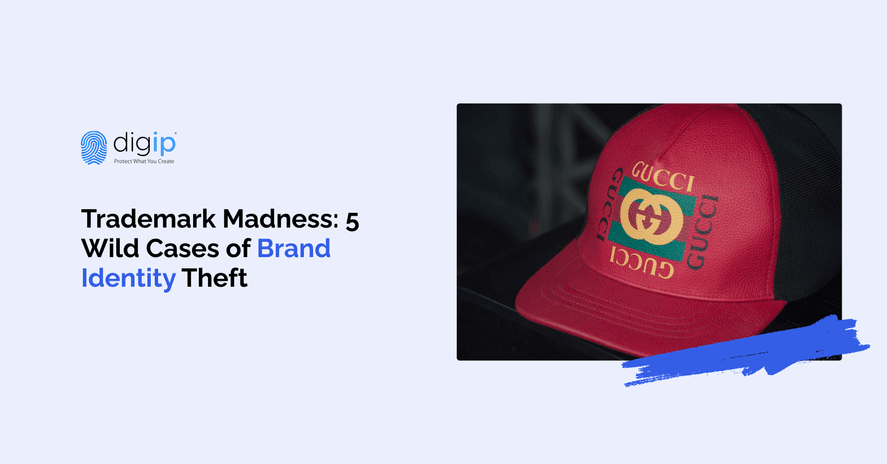
- Trademark
Trademark Madness: 5 Wild Cases of Brand Identity Theft
Trademarks are an important aspect of protecting brand identity. Unfortunately, this also makes trademarks an attractive target for theft. The document discusses several notable cases of trademark infringement that demonstrate the extremes some brand infringers will go to in order to profit from the goodwill of established brands. These examples show how seriously companies take infringement of their trademarks and the vigorous legal actions they are willing to pursue to defend their intellectual property rights. The cases described range from knock-off fast food restaurants to counterfeit fashion items. The document suggests that these trademark disputes often involve elements of deception, greed and rivalry between the involved parties. The legal battles arising from such infringement can be complex, costly and damaging to the brands involved. Thus, companies expend significant resources to prevent trademark infringement and defend their trademarks through the court system.
What Is Trademark Infringement?
Trademark infringement is when someone uses a trademark (like a brand name or logo) without the permission of the trademark owner. As a society, we’ve come to expect companies to guard their trademarks vigorously. After all, a brand’s identity is its lifeblood.
Some cases of infringement are pretty straightforward, like when a company outright steals another’s name or logo. But other times, things get weird. Like when a certain yoga company sued another over their similar-sounding names (both containing “yoga"—shocker!!). Or when a candy company sued a rapper over a lyric mentioning their product.
The outcomes of these cases can be surprising. Sometimes the little guy prevails, armed with only their wits and a Kickstarter campaign. Other times, the big corporation aims their legal arsenal at the smallest of offenders to make an example out of them.
Love ‘em or hate ‘em, big companies do have a right to protect their brands. But some take it a bit far, launching lawsuits that seem more like publicity stunts than anything else. When that happens, it’s hard not to root for the underdog. After all, do we really need mega-corporations monopolizing common words and policing self-expression?
As frivolous as some of these cases seem, trademark law is complex. But one thing’s for sure - when it comes to branding, companies don’t mess around. For better or for worse, their identities are their most valuable asset, and they’ll do whatever it takes to defend them.
Apple vs Apple: The Battle of the Apples
It's a tale as old as time - two companies fighting over the rights to a name. In this case, it was Apple Records vs Apple Computer (now just Apple Inc.)
A Beatles-y Problem
In 1978, those loveable Liverpudlian moptops The Beatles founded Apple Records. Then some upstart Silicon Valley tech company had the audacity to also call themselves Apple. The Beatles were not pleased, to say the least. They sued the tech company for trademark infringement.
An Agreement...For Now
In 1981, an agreement was reached. Apple Computer paid Apple Records $80,000 and promised to stay out of the music business. All was well for a while.
The iTunes Upset
Then came iTunes. When Apple launched the iTunes Music Store in 2003, Apple Records saw red and sued again. After a lengthy legal battle, another deal was struck in 2007. Apple Inc. gained ownership of the Apple Records' trademark and the Beatles' company walked away with $500 million.
All You Need is Litigation
And so ended one of the longest-running and most expensive battles in trademark law history. Turns out that in business, all you really need is litigation, litigation, litigation. At least if you're Apple. The Beatles probably wished they could just "Let It Be," but half a billion dollars surely helped ease the pain of surrendering their brand. And that, friends, is how the Apples finally learned to co-exist in harmony.
Louis Vuitton Sues Chewy for Trademark Infringement
You know you’ve made it big when cheap knockoffs of your luxury goods start popping up everywhere. For Louis Vuitton, this dubious milestone came in the form of pet products. Yes, you read that right. The maker of $10,000 handbags took one look at Chewy’s new line of plush pet beds, collars and carriers and saw red. Or rather, brown—the signature LV monogram print emblazoned on said pet products.
Cease and Desist
Vuitton’s legal team fired off a trademark cease-and-desist letter to Chewy faster than you can say “trademark dilution.” How dare this upstart pet supplies company sully their iconic brand by churning out products for gasp animals?! Chewy’s infringement was “causing immediate and irreparable harm” to their reputation, Vuitton claimed.
A Dog-Gone Shame
What’s a multi-billion dollar company to do in the face of such an assault on their brand integrity? Sue, of course! Vuitton sought damages and an injunction against Chewy to stop production of the offending pet products immediately. For its part, Chewy asserted that its pet line was meant as an “homage” to the fashion house and that no customer would mistake their products as actual Louis Vuitton goods.
Case Dismissed
In a rare defeat, the court sided with Chewy, dismissing Vuitton’s lawsuit. The judge found no grounds to believe Chewy’s pet products would confuse customers or dilute the Louis Vuitton brand. Vuitton’s trademark protection, it seems, only goes so far. While their handbags may be coveted luxury items, their brand isn’t so exclusive as to extend to the realm of pet products. For now, at least, Chewy’s controversial homage lives on, allowing pets everywhere to show off their haute couture. Touche, Chewy!
Monster Energy Tries to Sue Monster Fish Keepers
Really, Monster Energy?
Apparently, the makers of Monster Energy drink believe they have a monopoly on anything “monster.” In 2012, they sued a company that makes aquarium filters called Monster Fish Keepers. Because, you know, people might confuse an energy drink with equipment for their goldfish bowl.
Cease and Desist This
Monster Energy sent a cease and desist letter to Monster Fish Keepers, claiming that the use of “Monster” in their company name infringed on Monster Energy’s trademark. Monster Fish Keepers’ response? A polite but firm refusal to change their name, pointing out that they operate in completely different industries.
Splashing in Different Ponds
Turns out the courts agreed. They ruled that because the companies operate in distinct markets, consumers were unlikely to confuse them, even with the shared use of “monster.” Looks like Monster Energy was fishing for a lawsuit but only came up with red herrings. Meanwhile, Monster Fish Keepers continues helping hobbyists create awesome aquascapes, monster energy drink be darned.
The key takeaway here is that trademark claims require proving a likelihood of confusion in the minds of consumers. Operating in totally separate industries, as Monster Fish Keepers demonstrated, is a great way to splash those kinds of frivolous lawsuits. Unless Monster Energy wants to start selling goldfish, they’d better keep their mitts off anything “monster” that isn’t an energy drink.
Chanel Goes After Etsy Shop Owner
You know you’ve made it big when a luxury fashion house tries to sue you. That’s what happened to Kate Spade, an Etsy shop owner who dared to use “Chanel-inspired” in her item listings.
The Trademark Infringement
Chanel’s legal team claimed that Spade’s use of their brand name to describe her products—acrylic keychains and bag charms—violated their trademark. According to Chanel, any use of their brand, even in a “inspired by” way, would “create a false impression that her products are authorized or endorsed by Chanel.”
The Surprise Victory
In a rare win for the little guy, Spade prevailed. The judge dismissed Chanel’s case, ruling that Spade’s use of “Chanel-inspired” was “ornamental” and not misleading. Spade’s products were also found to be non-competing since no one would mistake a $25 keychain for an actual Chanel handbag.
Lesson Learned
The moral of the story? Don’t mess with crafty Etsy shop owners. They may be small, but they’re scrappy. And while Chanel’s legal arsenal is formidable, the law isn’t always on their side. When it comes to trademark infringement, context is everything. Using a protected brand name to truthfully describe an inspired-by product is very different from slapping a Chanel logo on a counterfeit.
Kate Spade’s victory gives hope to little guys everywhere. And as for Chanel, they learned that sometimes it’s best to live and let live. Their brand is too iconic to be diminished by a few Chanel-inspired keychains. The fashion house would be far better served focusing their legal might on battling actual counterfeits, not small-time fans paying homage to their brand.
How to Protect Your Business From Trademark Infringement
Watch Out for Copycats
As your business grows successful, copycats and trademark infringers may come out of the woodwork trying to cash in on your brand. Be on alert for businesses popping up with names, logos or products that seem just a bit too similar to your own. Nip that nonsense in the bud by sending a strongly-worded cease and desist letter. If that doesn’t work, you may need to get litigious to defend your brand.
Register Your Trademark
The best offense is a good defense. Register your business name, logo, and any important slogans or product names as official trademarks. This gives you legal rights to the brand identity and allows you to take action against infringers. The trademark application process can be tedious, but think of it as an insurance policy for your business.
Stay Vigilant
Trademark infringement isn’t a one-and-done deal. You need to routinely monitor for copycats and take action when needed. Search online for businesses with similar names or products, and keep an eye out for logo or product knockoffs. Larger companies may even hire “brand protection” firms to help patrol for infringement on their behalf.
While trademark madness can feel like a big hassle, protecting your brand identity is worth the effort. After all, your brand is your business’s most valuable asset. Defend it like you would your own child—with a mix of nurturing care and ferocity against all who would try to harm it! Staying one step ahead of infringers will help ensure your business’s long term success.
Frequently Asked Questions About Trademark Registration
How long does the process take?
The trademark registration process can take anywhere from 6 months to over 2 years, depending on the category and whether any objections are raised. The process tends to be complex, time-consuming and tedious around the world. Trademark offices face backlogs and inefficiencies that result in lengthy wait times for applicants.
Do I really need to register my trademark?
Technically, no. You automatically have common law rights to a trademark just by using it. But registration provides legal benefits like nationwide protection, the ability to recover profits and damages in infringement cases, and deterring copycats. If your brand has any value, registration is worth the hassle.
What happens if my application is rejected?
Don’t despair if your application is initially rejected. The USPTO frequently issues “non-final” rejections for issues that can be overcome. You’ll have 6 months to respond and argue against the rejection. Work with your trademark attorney to strengthen your arguments or narrow the scope of goods and services. If that doesn’t work, you can file an appeal with the Trademark Trial and Appeal Board. Persistence pays off, so keep fighting the good fight.
How much does a trademark registration cost?
Compared to the value of your brand, these fees are reasonable. There are alternative options for trademark registration at lower prices.
Conclusion
So there you have it, folks. A handful of truly remarkable trademark disputes that demonstrate how fiercely big companies defend their valuable brands. While you appreciate knockoff products, remember that companies go to great lengths to protect their trademarks from infringement. Unauthorized copies hurt brand image and profits, no matter the good humor involved. Respect trademarks - one day you may build a brand of your own worth defending.
- Trademark



